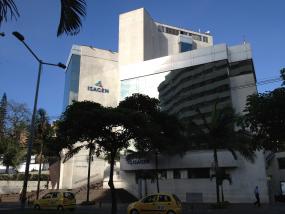On January 13, a majority share in the Colombian state-owned company ISAGEN was sold to Brookfield Asset Management, a Canadian private investment fund. Controversy has at times swirled around the hydroelectric power company, as in the case of its unilateral decision in 2014 to end talks intended to manage the negative impacts of Hidrosogamoso, one of the country’s biggest hydroelectric power plants. Nevertheless, the sale of ISAGEN to Brookfield is far from achieving unanimous public acceptance.
The sale of a 57.61% share in the company to a Toronto private fund is worrying for several reasons. The first of these is the price: the Canadian consortium bought the shares at their lowest market price. The second has to do with the dubious legality of the call for tender. Only one bid was received, suggesting that the Santos government may have made a deal with Brookfield for a rapid sale. Santos has been trying to raise revenue for his 4G Project, involving the construction of 8000 km of roads across the country, and is now announcing that the income from the sale will be invested in 4G. The goal of 4G is to facilitate “trade” in goods – i.e., the mining and export of raw materials by multinationals.
It came as no surprise that neither the Santos government nor Brookfield paid any attention to the public’s concerns. It is foreseen that the privatisation of ISAGEN will lead not only to higher electricity rates, but also to denial of service to people unable to afford them. That, is electricity will become a private business instead of a public service. Already, global warming and the current El Niño climate phenomenon are reducing water levels and affecting hydro production, with a concomitant rise in electricity rates.
Germán Corredor, director of the Energy Observatory of the National University of Colombia, is concerned that the geothermal and wind energy projects undertaken by ISAGEN will be abandoned by the Canadian consortium, as multinationals are interested in profit and not the public interest.
In addition, the country’s energy sovereignty is at risk. The sale means that the government will forgo 3 billion pesos (some 1.3 million Canadian dollars) each year, and will also forfeit its national expertise in electricity research and production.
Another factor is that Brookfield has, with the purchase of ISAGEN, acquired usufruct rights to thousands of hectares, allegedly so that it can make a return on its investment. It will be allowed to mine for minerals, oil, and other resources on these lands with no accountability to the local population or the Colombian government.
In this case as in others, the Santos government has shown its willingness to kowtow to Canadian and other multinationals at the expense of ordinary Colombians. Opposition movements are now in full swing. On January 12, a large rally was held in Medellín to protest the privatisation of ISAGEN. The sale of the company is one among many motives for a general strike called by workers’, indigenous, and other social and political groups and movements, to be held in the coming months. As activists, we must support the work of everyone who resists the domination of multinationals, especially those headquartered in Canada.
Sources:
http://colombiainforma.info/politica/seccion-politica/2998-polemica-ven…
http://www.wsj.com/articles/colombian-president-takes-heat-for-sale-of-…
